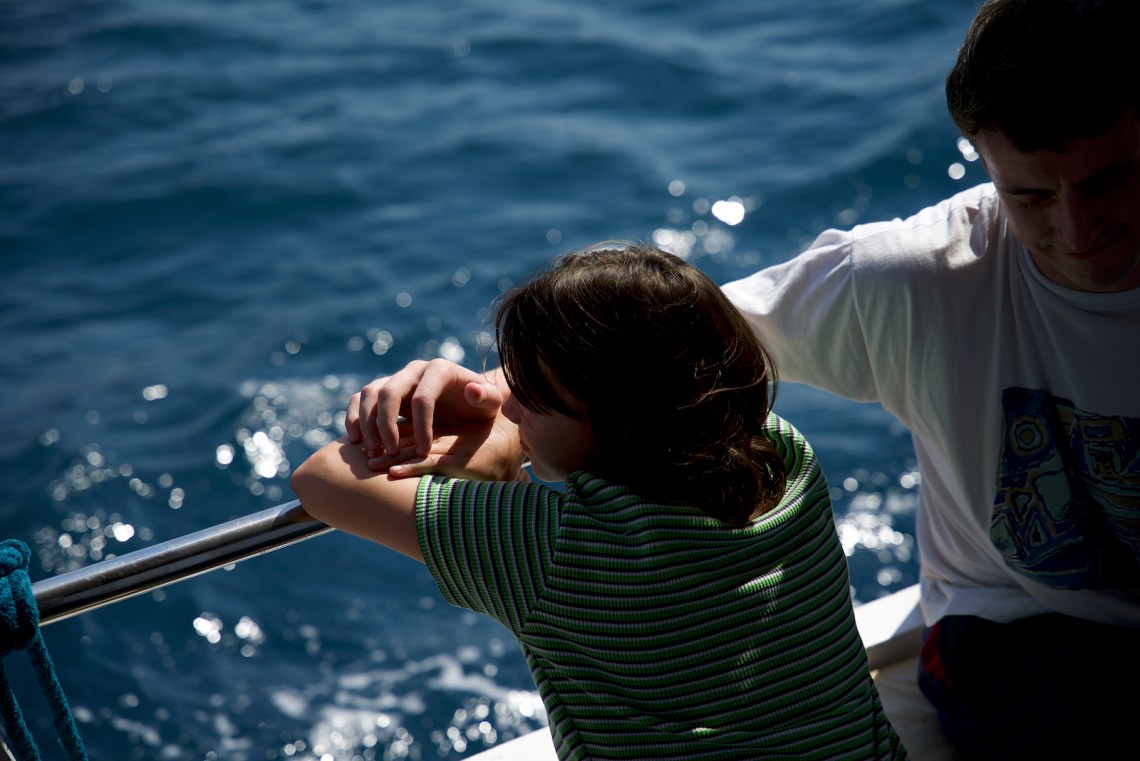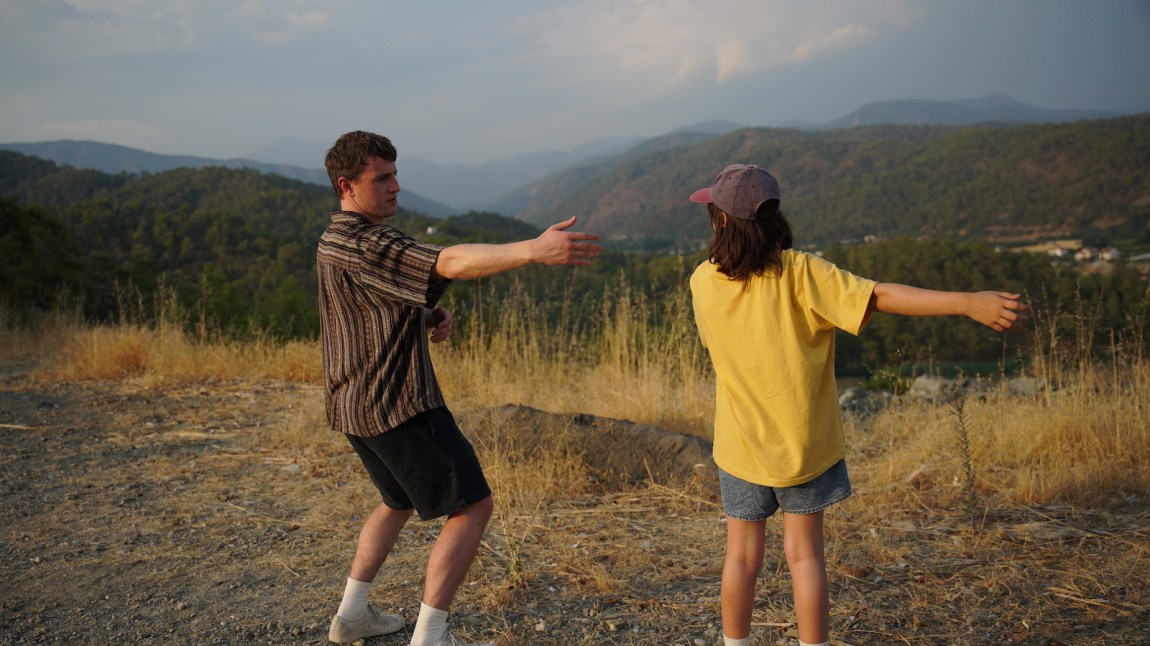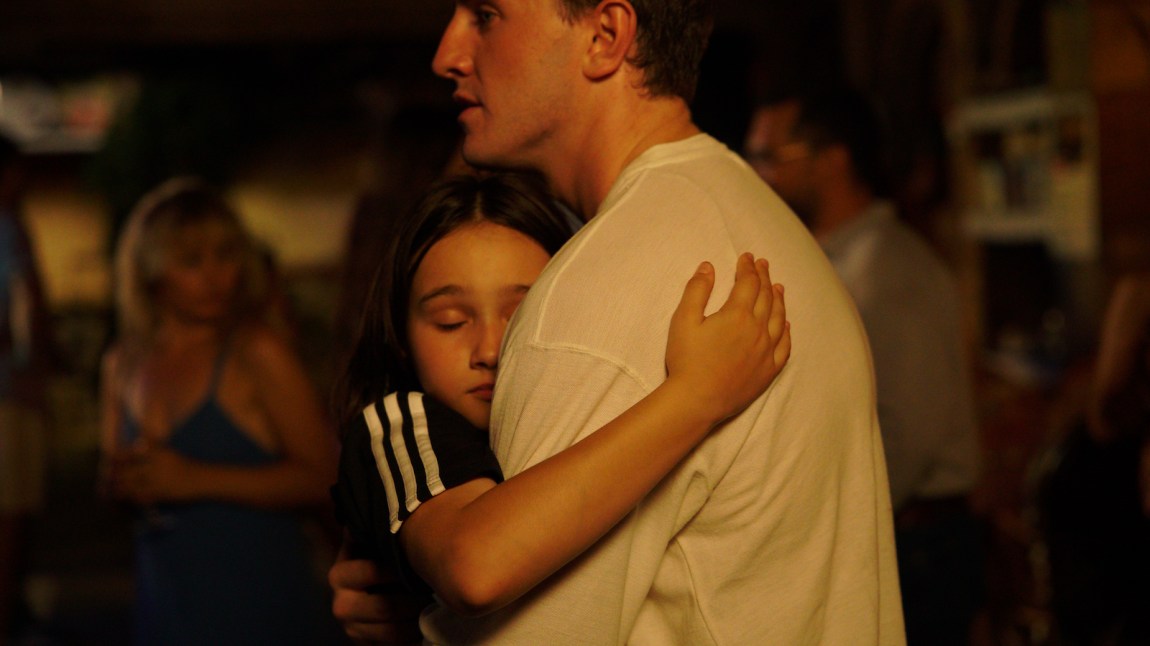Aftersun opens with a home movie, a daughter filming her father. Sophie (Frankie Corio) has just turned eleven. Calum (Paul Mescal), who will turn thirty-one by the end of the film, is dancing. “These are my moves,” he smiles, and you can almost hear her eyes roll. “When you were eleven,” she asks, zooming in on his face, “what did you think you’d be doing now?” He looks down and the frame freezes. So this is to be an elegy.
It is the story of a parent who will die—who has died. This is a spoiler only insofar as knowing that the mother will die could ruin the experience of watching Tokyo Story, which is to say only insofar as the death of a parent is a surprise. It is, of course. But you knew it was coming. And then it did, and now you know. This temporality, from future to present perfect, eliding the unspeakable present imperfect and future perfect—“is dying,” “will have died”—gives force to Aftersun’s otherwise delicate narrative. It is a reminiscence haunted by dread, which might be a good definition of grief.
Calum and Sophie are on vacation in Turkey. We can guess, given the presence of a consumer camera that shoots on digital video and, later, the most natural-looking performance of the Macarena you’ve seen since Janet Reno was attorney general, that it’s about 1997 or 1998. It is eventually made clear that adult Sophie (Celia Rowlson-Hall), a millennial with a baby of her own, is watching these old tapes—fleeting documents of what she and her dad were like, Calum’s sly humor, Sophie’s antic energy—and remembering or imagining what happened outside the frame. Aftersun could be understood as the art project that she makes as she sits with her memories and recordings and tries to piece together a portrait of her father. Calum, meanwhile, turns out to have been reminiscing while still on vacation, watching the tapes each night like dailies, holding fast to the experience while it’s fresh in his mind.
Clips from the home movies punctuate the film, the pale, watery light of digital video testifying to their cinematic factuality. In between, on celluloid, the languorous days of vacation: father and daughter laze by the pool, play billiards, go to a mud bath and a sauna, visit a rug merchant, tease each other, swim, apply sunscreen during the day and toner at night. Looking back on her younger self, a child on the cusp of adolescence with an adored father whose fallibility she is beginning to grasp, adult Sophie sees a perceptive, sensitive girl approaching a loss she is still struggling to understand.
Adult Sophie, or perhaps the director, Charlotte Wells. Wells also happens to be a Scottish thirtysomething whose father died when she was young. In interviews she has said that Aftersun is not strictly factual but “emotionally autobiographical.” This idea should be familiar to anyone who has ever recounted a story whose details they’ve forgotten.
*
For a film with only the barest exposition, which dedicates its oblique framing and patient editing to the careful construction of feeling, Aftersun is dense with meaning and unspoken narrative. Calum and Sophie arrive in Turkey, take a tour bus to a tacky resort peopled by other British tourists, explore the local environs, and grow closer and further apart. He and Sophie’s mom, who has primary custody back in Scotland, are on friendly terms, but Calum, who moved to London, is a restless young man, given to a third beer with dinner, standing on the hotel balcony late at night smoking a cigarette, looking at the sky, and dancing.
The vacation is clearly a special occasion, not least because it must have cost dearly for Calum, whose current job is “this new thing going on with Keith.” On the first night in their room, they discover that there is only one small bed. Calum dutifully calls down for a cot, ceding the mattress to his daughter. The next morning they are awakened by the ringing sounds of construction: the hotel is being renovated in the off-season. Yet this flat disappointment—the deflating indignities of poverty, even while on vacation—intensifies the sense of freedom, the delight of time alone with a parent, the need to enjoy a rare luxury.
But outlining the film’s plot feels like a graver betrayal than spoiling the end. Works of grief are typically described as “raw,” as if the creator had simply ripped off a limb. Aftersun is fragile, as befits a film with the title of a poetry collection. Each scene delicately brushes its meaning like layers of paint: by the pool on the morning after their arrival, Calum rubs sunscreen into Sophie’s back, apologizing for the resort’s limitations while trying to pick up on the last conversation they had together, a conversation she glancingly remembers. Underneath their dialogue, the shrill ping of hammers. This is the awkward rhythm of reuniting with the noncustodial parent, who is nonetheless determined to care for you, scored by the impingement of money, obligation, and the adult world.
Advertisement
Orbiting the story of a parent’s mortality is that of a child’s maturity. Sophie, who will start at a secondary school in the fall, takes alternately tentative and bold steps toward adulthood, and therefore away from her father. “Why don’t you go over and introduce yourself?” Calum asks her, indicating two children who must be around eight and six years old. “Dad, no, they’re like kids,” Sophie scoffs. Instead, she invites two teenage boys to join them in a game of pool, confidently breaking the rack herself. Where Calum largely confines his attention to Sophie, she is drawn to these long-limbed adolescents, who swan about in yellow bracelets that mark them as the privileged few with access to the all-inclusive experience—“You can get as much as you want of anything,” says a girl with a pierced ear, inadvertently advertising the adolescent fantasy of adulthood. (Sophie is also, mysteriously, briefly captivated by a bright pink swizzle stick in the shape of a woman’s naked body.) And always in the film’s background, swarms of paragliders—a risky adult pastime she is not allowed to try—flit about like dragonflies.
Wells sees everything with equanimity: Sophie getting affectionately teased by the big kids, recalling the episode of The Simpsons where Lisa befriends a group of oceanside teens and feels cool for once; or swimming with ease in the ocean with her dad but finding herself in over her head when the older kids start making out with each other in the pool. The role calls for the sensitivity of the budding artist, the impishness of childhood, the yearning of adolescence, security and sudden insecurity, the unspoken intimacy of parent and child. Corio is marvelous.
Mescal no less so. His handsome, charming Calum can’t be mawkish, awash in self-pity, because he is struggling mightily to keep Sophie from seeing his demons. She evinces some anxiety on his behalf, noting with a tremble in one of her video diaries that he has gone on “some scuba diving thing” despite not having a diving license. “He’ll be fine. Yeah. He’ll be fine, I’m sure,” she reassures herself. We get a child’s glimpses of his recklessness: crossing the street in front of a bus or balancing precariously on the balcony railing. For the first half of the movie, he sports an arm cast—from an accident he doesn’t remember—in which he fumbles to light his cigarettes.
But he is a doting father, protective and thoughtful, negotiating Sophie’s desire for independence with his responsibility to keep her safe. He indulges her in an intimate, grown-up rapport; they start their trip sharing a private joke at an English tour guide’s expense, Sophie laughing richly at her father’s impersonation. Calum practices tai chi, occasionally to Sophie’s embarrassment, but he is good at it, just as he is good at dancing. In one scene his movements rhyme with those of a fan in the corner of the room, which twists and blows cool air in time with him.
*
“If you let it rest on an object for a wee while it gets the lighting right,” Calum observes early on as he tries out the camcorder, and Aftersun seems to abide by this premise. The eccentric compositions—people and props placed about the frame in seemingly random order—are held until a balance reveals itself. Gregory Oke’s cinematography is complemented by Blair McClendon’s elliptical editing so that individual scenes have the aura of memory, an experience broken down to its elements: Sophie, Calum, ocean. Hand, face, cotton ball. Boat, mountain, shore. Through a toilet stall keyhole, a glimpse of the arm of an older girl as she mimes jerking someone off while telling her friend about a recent escapade with a boy. Experimental techniques are used less in a spirit of inquiry for its own sake than for their effect. Wells plays with a mostly shallow depth of field to highlight presences on the rim of Sophie’s awareness, pulling focus from Sophie to the arm of Michael, the boy playing arcade games with her, as he brushes her own, Calum in the deep background ordering at the bar.
At the furthest edge of Sophie’s awareness is a nagging anxiety, formed right at the seam of her maturity and Calum’s mortality. On one of their last nights in Turkey, she volunteers the two of them to sing REM’s “Losing My Religion,” a shared enthusiasm, at a resort karaoke show. Calum, drunker, perhaps, than he intended, and dwelling on his private miseries, refuses to go onstage. Sophie, in a mortifying and triumphant display, presses on alone in several long takes that showcase Corio’s tremendous performance as her anxiety gives way to disbelief and finally disappointment and sadness, mixed in with a brave insistence on finishing the song. Afterward, Sophie decides to spend her evening with the teens, and has her first kiss with clumsy Michael.
Advertisement
Calum, chastened and ashamed, gets drunker, stumbles down to the shore, and walks into the sea. The camera looks out at the dark water for several agonizing moments. He does not return. It is Aftersun’s first explicit acknowledgment of what has otherwise only been suggested, but it is also not Calum’s death. The film has been told to this point from Sophie’s perspective, and she wouldn’t have seen Calum’s lonely descent. It is, rather, the manifestation of her terror, a nightmare illustrated with the almost pure archetype of a parent vanishing into darkness.
After her kiss, Sophie returns to their hotel room to find herself locked out. Hours later, when the concierge wakes up to let her back into the room, we are as shocked and relieved as she is to find Calum passed out on her bed. With the quick elasticity of a child’s mind, she incorporates this news and the story returns to its gentler course. The next morning, Calum apologizes at the mud bath, and they wash each other’s backs. The camera pans over the water as eddies of mud and silt curl away under the sun. She was being silly after all, no need to worry.
The final scenes, following the introduction of a haunted adult Sophie in Brooklyn, signify much harder, abruptly jostling what has otherwise been cradled. Father and daughter’s joyful last day on vacation, dancing together at a supper club, Calum at his most handsome and charming, are intercut with a metaphorical vision of his death, sweaty, drunk, and high, dancing in a strobing nightclub, as adult Sophie screams soundlessly, desperate to get his attention.
At my mom’s wake, I asked an old family friend who had also lost his mom unexpectedly, many years before, if it ever got less painful. “Eh,” he said. This was comforting. My mother’s books and sunhats, her collection of sea glass and stacks of notepads are arrayed about my home, and I have taken to using her preferred sunscreen, Olay Complete. Letting any of it go is unthinkable. Wells knows the solace of holding onto grief.
A cliché about maturity is that you learn to appreciate your parents more fully, as nonidealized people, as human beings who struggled also, who don’t know the answers, who have been plodding along all this time, just like you. This is half true. You also come to see them as fragile, weakened by struggles you don’t yet, or might never, know. Then one day you see their lives entire, a complete form that will fall away behind you—that has fallen away behind you.





